I used to think sleep was just something you squeeze in between work and whatever you’re binge-watching. Turns out, it’s kind of a big deal. Like… foundational. Energy, focus, mood, metabolism—it all runs through how well you sleep.
After a lot of trial, error, and late-night Googling, I’ve put together everything that actually works. If you want better sleep without overcomplicating it, this guide’s for you.
1. Reset Your Sleep Clock (Circadian Rhythm)
If your sleep is inconsistent, your body doesn’t know when to wind down or wake up. Start by waking up and going to bed at the same time every day—yes, even on weekends. That trains your internal clock and makes it easier to fall asleep naturally. Get sunlight in your eyes within 30 minutes of waking to anchor your circadian rhythm. If you can’t get outside, even 5–10 minutes near a bright window helps.
Also: avoid bright overhead lights after sunset. Switch to warm, low lighting as you approach bedtime. Our brains are wired for sunrise and sunset, not LED floodlights.
Sun exposure also helps regulate melatonin production, which makes it easier to fall asleep at night. Morning and midday sunlight are both beneficial for resetting your biological clock.
Quick Win: Wake up at the same time every day and get sunlight in your eyes ASAP. Your body will thank you.
2. Create a Simple Night Routine + Power Down Hour
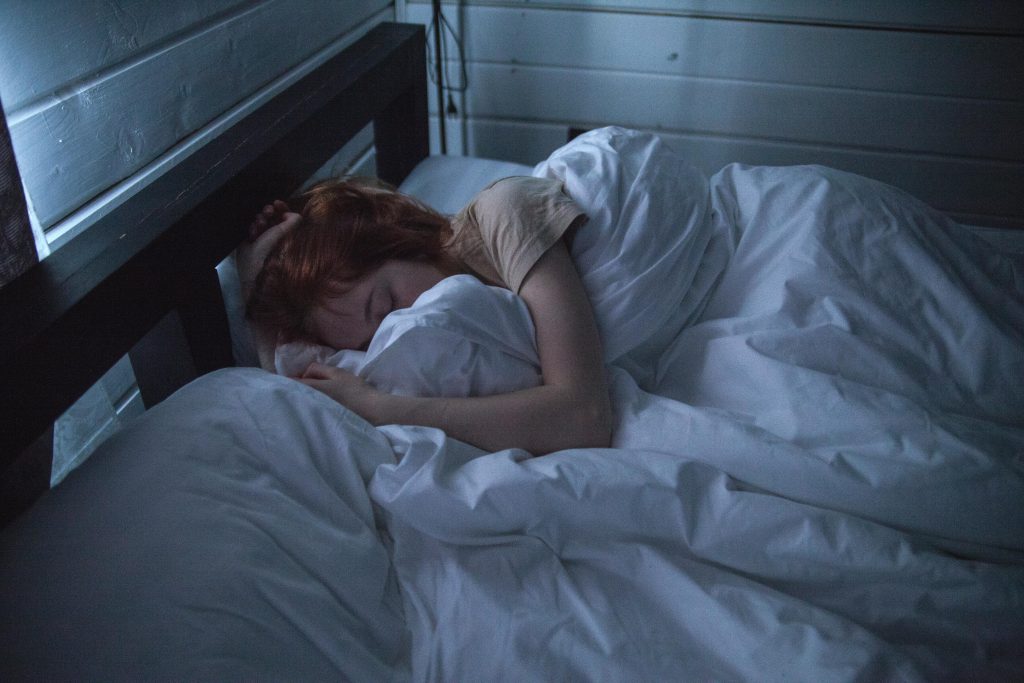
Your body needs cues that it’s time to relax. A consistent routine helps transition from go-go-go mode to rest. Try shutting down work and screens at least an hour before bed. Swap stimulation for something slow: a book, a warm shower, light stretching, or journaling. Keep your routine simple and repeatable—the more automatic it feels, the more your brain will associate those steps with sleep.
Try including:
- A warm herbal tea (like chamomile or lemon balm)
- Gentle yoga or mobility work
- Listening to calming music or ambient sounds
- Practicing gratitude journaling or writing down tomorrow’s to-dos to offload your brain
- Short breathing exercises like box breathing or the 4-7-8 method to help calm your nervous system
You can also try a structured “Power Down Hour.” At 60 minutes before sleep, start dimming lights and shutting off screens. At 45 minutes, do something calming like stretching or sipping herbal tea. At 30, journal or do a quick mental check-in. At 15, brush your teeth, put on pajamas, and keep things quiet. Then, lights out. Bonus: Use the last few minutes to do a body scan meditation. It’s like giving your nervous system a lullaby.
Quick Win: Pick just 2 things and do them every night. That’s your routine.
3. Eat and Supplement for Sleep

Food has a bigger impact on sleep than people think. Certain foods can help you wind down naturally. Kiwis and tart cherry juice have been shown to promote better sleep thanks to natural melatonin. Almonds, pumpkin seeds, bananas, and oats are all rich in magnesium and tryptophan, which help your body relax. Complex carbs like sweet potatoes or oatmeal can actually support melatonin production if eaten a few hours before bed.
What to avoid:
- Caffeine after 2 PM (or even earlier if you’re sensitive)
- Alcohol within 3–4 hours of bedtime
- Heavy, spicy, or greasy meals late in the evening
Optional supplements (talk to your doctor first):
- Magnesium glycinate (for muscle relaxation)
- L-theanine (calming without sedation)
- Glycine (amino acid that helps lower body temperature)
- Low-dose melatonin (0.3–1mg max; higher isn’t better)
- Ashwagandha or lemon balm (herbal stress reducers)
Quick Win: Try a banana or tart cherry juice an hour before bed.
4. Set Up Your Room for Sleep
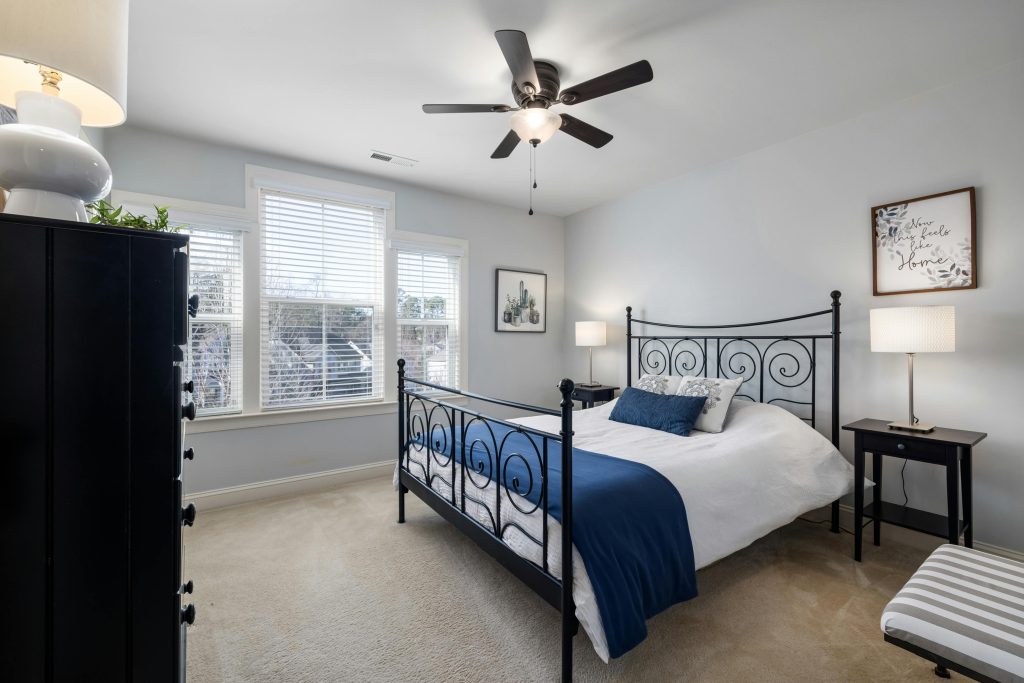
Think of your bedroom as a sleep-only zone. Keep it cool (between 60–67°F or 15–19°C), dark, and quiet. Blackout curtains, sleep masks, and white noise machines can all help block distractions. If you live in a noisy area, earplugs are a game-changer.
Declutter your space—visual noise can make it harder to calm down. Ban bright alarm clocks, blinking electronics, or glowing chargers. Keep your phone out of arm’s reach (or out of the room altogether).
Consider investing in:
- High-quality sheets and a mattress you love
- A pillow that supports your neck
- Natural fabrics like cotton or bamboo for breathability
Mattress matters: If your mattress is too soft, too firm, or just plain uncomfortable, it can wreck your sleep night after night. Look for one that supports your spine in a neutral position—memory foam, hybrid, or latex mattresses tend to be solid picks. If you sleep hot, get something with cooling gel or breathable layers. You spend a third of your life on this thing—it should feel amazing every time you lie down.
Quick Win: Make your room pitch black and drop the temp a couple degrees.
5. Watch Out for Sleep Killers
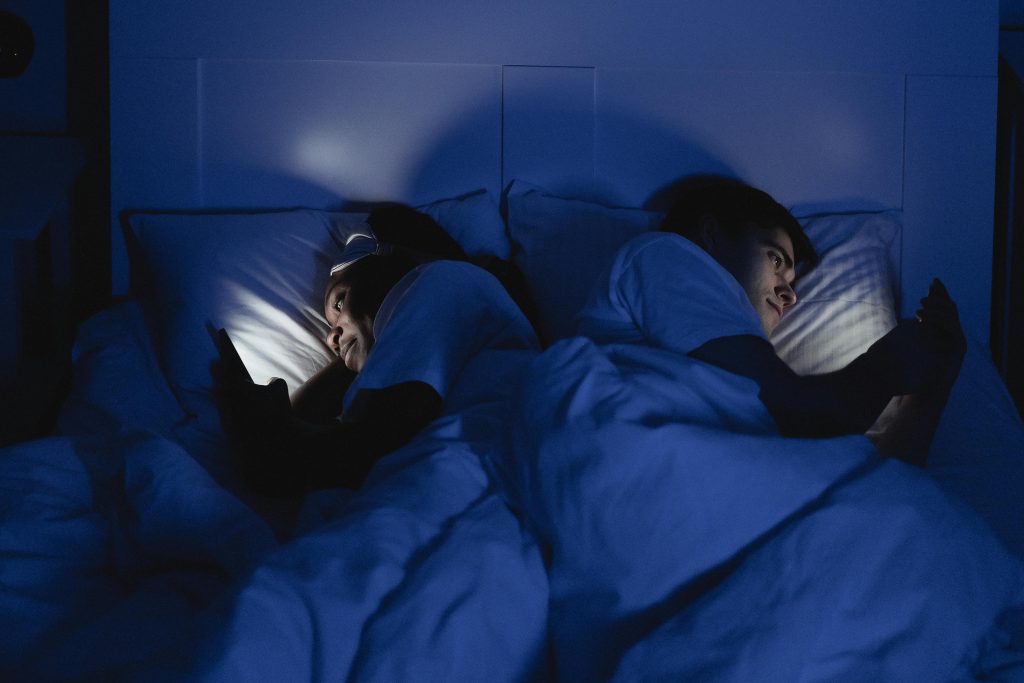
Some habits are sleep disruptors in disguise. Scrolling your phone in bed, having caffeine late in the day, drinking alcohol to “relax,” and eating too close to bedtime all mess with your body’s sleep signals. Arguments, stressful thoughts, and overthinking at night also keep your mind wired.
Sleep killers to watch for:
- Blue light exposure after dark (phones, TVs, laptops)
- Napping too late in the day (keep naps under 30 mins, before 3 PM)
- Not moving enough during the day (sedentary days = restless nights)
- Overstimulating exercise too close to bedtime (switch to morning or afternoon)
Quick Win: Stop screen time 1 hour before bed. Just one hour. It helps.
6. Move, Breathe, and Wind Down
Exercise is one of the best natural sleep aids. Regular movement—whether it’s walking, lifting, running, or cycling—helps reduce stress, balance hormones, and improve sleep quality. Just don’t do high-intensity workouts late in the evening. That late spike in adrenaline and body temperature can keep you up.
Instead, try:
- Morning or afternoon strength or cardio sessions
- Evening yoga or stretching
- Gentle mobility or foam rolling before bed
Yoga and breathwork can be especially helpful. Poses like legs-up-the-wall, child’s pose, or reclining twists activate your parasympathetic nervous system. Add in slow breathing or meditation, and you’ve got a sleep cocktail that’s 100% hangover-free.
A few breathwork techniques worth trying:
- Box breathing (inhale 4, hold 4, exhale 4, hold 4)
- 4-7-8 breathing (inhale 4, hold 7, exhale 8)
- Extended exhales (double the length of your exhale)
These signal your nervous system to downshift from stress to calm.
Quick Win: Move your body for at least 20 minutes today. Walk, stretch, dance—whatever. Then try a few minutes of slow breathing before bed.
7. Track What Works
No need to get obsessed with data, but a little tracking helps. Keep a log of your sleep times, how rested you feel, and any patterns you notice. Did something help or hurt your sleep that day? It could be a certain food, a stressful event, or an evening habit. Over time, you’ll see what makes the biggest difference and what to cut out.
If you like tech, apps like Sleep Cycle or Oura Ring can offer insight. But even a simple journal with notes like “Slept well after yoga” or “Woke up groggy after late wine” is incredibly useful.
Quick Win: Write down one thing you did today that helped (or hurt) your sleep.
8. Wake-Up Routine is Where It All Begins (How to Start the Day Like a Winner)
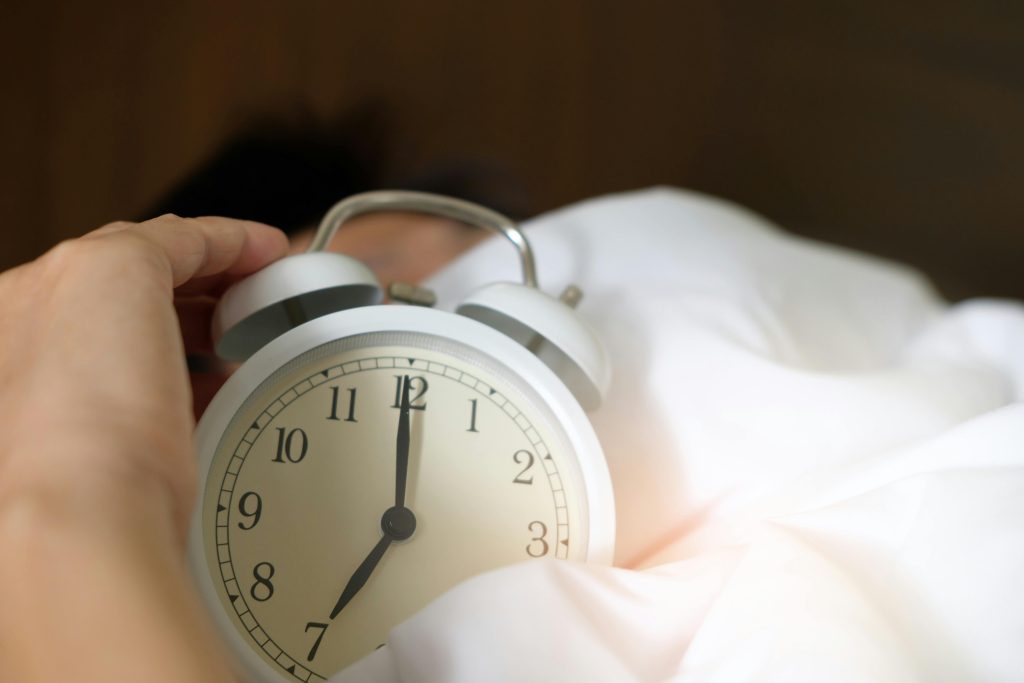
Good sleep doesn’t end when you close your eyes—it sets you up for how you start the next day. A strong wake-up routine helps lock in your circadian rhythm, boosts energy, and lowers the odds of zombie-scrolling through your morning.
Here’s how to kick off your day like a pro (and not a groggy crypt keeper):
1. Get sunlight in your eyes—immediately
This is the big one. Natural sunlight first thing in the morning anchors your internal clock and boosts cortisol (in a good way) to wake you up. Step outside for 5–10 minutes, even if it’s cloudy. No sunglasses. If you can’t get outside, open your windows wide and face the light.
2. Move your body (even a little)
You don’t need to crush a workout, but some movement gets your blood flowing and signals your brain that it’s go time. Try:
- 5–10 minutes of light stretching or yoga
- A quick walk around the block
- 20 jumping jacks while your coffee brews (no judgment)
3. Hydrate like you mean it
You lose a lot of water overnight. Before coffee, slam a glass of water (add lemon or electrolytes if you’re fancy). Bonus: it helps jumpstart digestion and alertness.
4. Avoid your phone for the first 30 minutes
Seriously—protect your brain from dopamine overload and external stress first thing. Give your own thoughts a chance to wake up before you let in the noise of texts, news, and doomscrolling.
5. Breathe or meditate
Just 1–5 minutes of breathwork or quiet time can help regulate your nervous system and give your day a centered start. Try:
- Box breathing (4-4-4-4)
- 4-7-8 breathing
- A short mindfulness app like Insight Timer or Headspace
6. Make it repeatable
Design a routine that’s easy to do even on groggy days. Stack it with habits you’re already doing (e.g. breathe while your tea steeps, stretch while your shower heats up). The key is consistency, not complexity.
Quick Win: Tomorrow morning, try this: wake up, drink a glass of water, step outside for 5 minutes, and do 10 jumping jacks. That’s it. Build from there.
Optional Sleep Tools (Not Essential, but Helpful)
You don’t need gadgets, but they can help if you’re struggling. Weighted blankets provide calming pressure. Red light bulbs are easier on your melatonin at night. Blue light blocking glasses can help if you must use screens. A good sleep mask and earplugs can block the world out completely. White noise machines are great if you live somewhere noisy.
Other tools to experiment with:
- Essential oils like lavender or cedarwood
- A warm foot bath before bed (relaxes the parasympathetic system)
- Cooling mattress pads if you sleep hot
- Meditation or sleep story apps like Calm or Insight Timer
- Breathwork apps or guided breathing routines (Wim Hof, 4-7-8, box breathing)
- Smart wearables (Oura Ring, Whoop, Fitbit)
- Sleep trackers and alarm clocks with sunrise features
- Muse headband for meditation
- Brain.fm for focus and sleep music
- Dodow sleep device (breathing/metronome light)
- Hatch Restore (light + sound + guided routine)
- Air purifier or humidifier for air quality
- Under-bed LED ambient lighting (in warm hues)
Quick Win: Try just one tool tonight. No pressure, just explore.
Final Thought
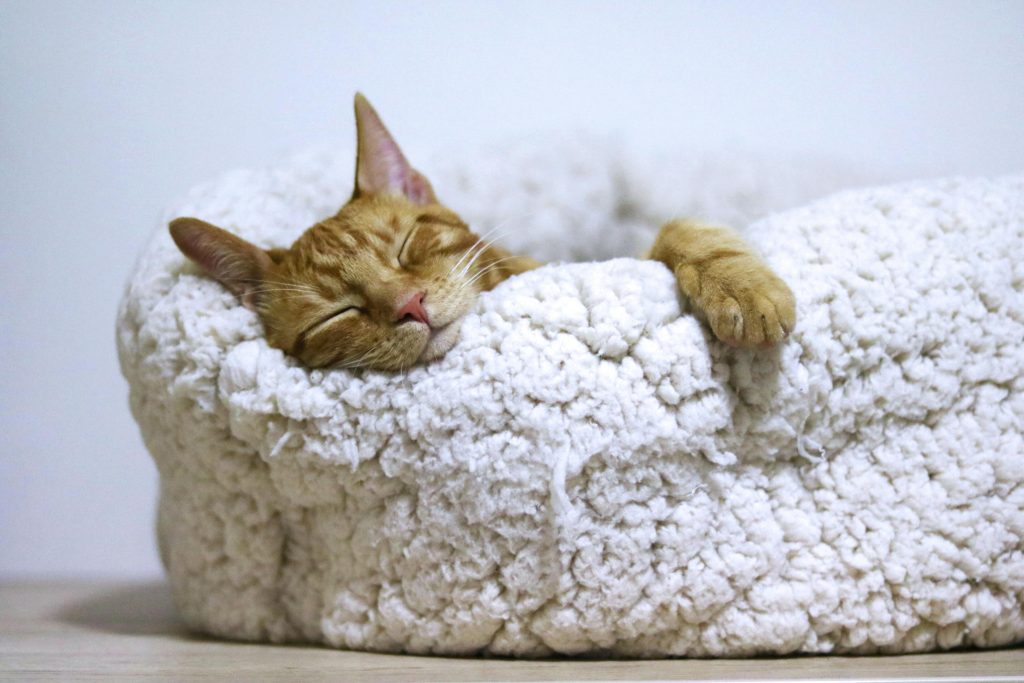
Better sleep doesn’t happen overnight. But if you pick two or three of these strategies and stick with them, you’ll feel the difference within a week or two.
You don’t need a $300 gadget or some elaborate sleep stack. Just a few smart habits, a consistent schedule, and a bit of intention go a long way.
Sleep is the foundation. Everything else—energy, creativity, focus—builds on top of it.
So stop glorifying being tired. Get the sleep. Wake up ready to win.
– Peter Wins



